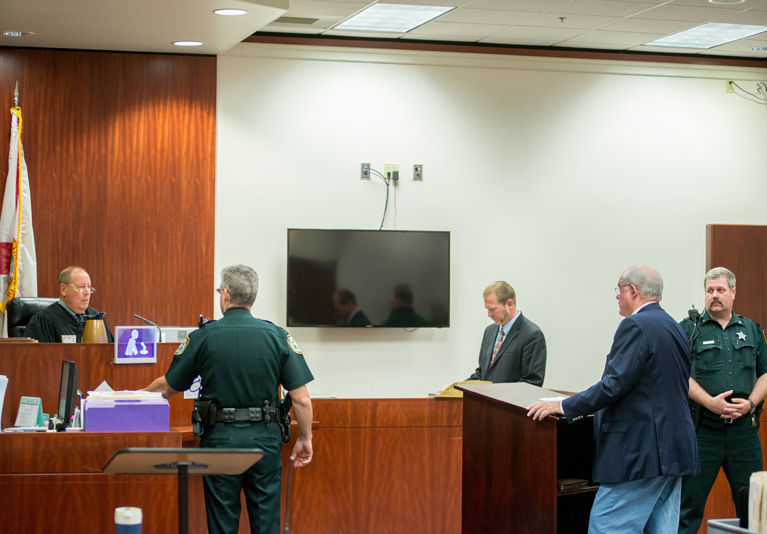
INDIAN RIVER COUNTY — Town of Indian River Shores Mayor Brian Barefoot and Councilman Dick Haverland each paid a $200 fine plus court costs Tuesday morning after being adjudicated guilty of a civil violation of Florida’s open government laws.
The two appeared in Judge David Morgan’s courtroom along with close to 100 other defendants who were there for arraignments on various charges. Morgan dispensed with first appearances and arraignments by video from the Indian River County Jail before calling Barefoot, and then Haverland to the podium.
Morgan explained to all the defendants that they had the right to a trial — either by judge or by jury — or that they had the right to accept responsibility and plea guilty, or as a third option, to plea no contest, which in the eyes of the court has the same result as a guilty plea.
Barefoot requested that Morgan dismiss the charge against him, to which Morgan replied, “We ain’t dismissing. I don’t have the power to dismiss,” adding that if Barefoot wanted a trial in which to make his arguments, the law provides him the right to a trial.
With each case in the courtroom that day, after entering a guilty or no contest plea, Morgan instructed the defendants that he would issue a sentence for the offense, and offered the opportunity for each person to say something on their own behalf.
Barefoot and Haverland both read lengthy prepared statements to Morgan, explaining the context of their actions, which boil down to an email exchange related to electric rates Town residents pay to Vero electric and how much more their constituents pay than if they were on the Florida Power and Light system.
To open his remarks, Barefoot reviewed his resume, that in addition to being the Shores mayor, he has 33 years of experience in financial services, seven years as president of a college and broad familiarity with Securities and Exchange Commission regulations.
“I take very seriously my responsibility,” Barefoot said.
Morgan acknowledged Barefoot’s qualifications and replied, “Your education, credentials and experience are impressive, but you see, that cuts both ways.”
Morgan said that someone with Barefoots’s education and experience “knows what he needs to know to abide by the law.”
Haverland explained that his part of the email exchange was only for the purpose of seeking the source of some information that had been provided at a publicly held meeting from which he had been absent.
“The State does not make the case that the information provided was relevant,” Haverland said.
Assistant State Attorney Chris Taylor spoke on behalf of the prosecution, saying, “The public had a right to be there during the discussion and they were not.”
Barefoot said his email back to Haverland, which was evidence in the State Attorney’s investigation, was simply an answer to Haverland’s question.
Morgan explained that most officials accused of Sunshine violations don’t mean any harm and are not trying to cook up some back-room deal. “The desire to provide information is a common defense,” he said.
Neither Barefoot nor Haverland appeared with a personal attorney, but Town Attorney Chester Clem was in attendance. As part of the officials’ sentences as recommended by Taylor, they must complete an educational program on the Sunshine law. Morgan said he would leave it to the Town Attorney to determine what was necessary.
In the corridor after the hearing, Clem said about the Sunshine law education, “We’ve already started that.”
Clem said he sent out a detailed memo to every elected or appointed member of every Town board, and that he plans to make presentations to those groups as well in the near future.
The emails in question were sent from the personal email addresses of Barefoot and Haverland. Clem said the Town Council and other volunteer board members use their personal email accounts because the Shores provides no official Town email for the Town Council to use.
Both Barefoot and Haverland still proclaim their innocence and that the complaint which led up to the civil charges, and the charges themselves, were unwarranted and unjustified.



